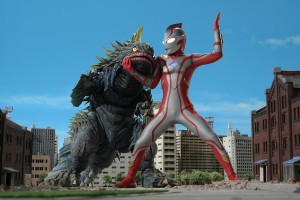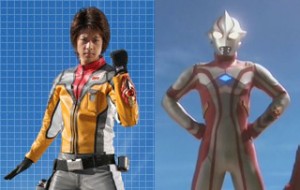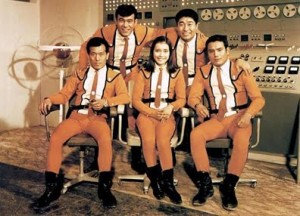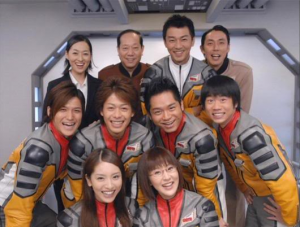 So Balticon happened. I’m not really going to do a full rundown of it here. Not that it was bad. It was a very full, very successful weekend. But I’ve tweeted all the good stuff, and I prefer to keep the stuff which set my teeth on edge between, well, me and the people who set my teeth on edge. And there were only really two of them, and I don’t think they can be trained to not set my teeth on edge, so…
So Balticon happened. I’m not really going to do a full rundown of it here. Not that it was bad. It was a very full, very successful weekend. But I’ve tweeted all the good stuff, and I prefer to keep the stuff which set my teeth on edge between, well, me and the people who set my teeth on edge. And there were only really two of them, and I don’t think they can be trained to not set my teeth on edge, so…
I do want to take a moment to thank many wonderful panelists and audience members I met up with for fascinating discussion and thought-provoking questions. I made some new friends, which is always great. I was also happy to spend time on panels with old friends Keith DeCandido and Don Sakers, and to have time to catch up with Nobilis Reed, Doc Coleman and J. Daniel Sawyer. I also enjoyed meeting novelist Charlie Brown, who had a lot of excellent advice on writing and (I confess to vanity) told me he’s a huge fan of the Arbiter Chronicles. Speaking of new friends, I spent a very pleasant Saturday evening at a party hosted by Shay Brodbeck, talking to, among others, Jean Marie Ward, Mike Czaplinski and Nobilis. I was a bit fuzzy by the end of it, as the selection of liquors was as generous and wonderful as the company; but, hey, isn’t that what convention Saturdays are for? And since I spent Farpoint Saturday sick in bed, this was a refreshing change.
And that’s all I got to say about that.
So, I’d like to take a moment to discuss a show I discovered quite by accident, but with which I’ve become mildly obsessed. The show is Ultraman Mebius, and you won’t find it either on American television or on Region 1 DVD. (Region 1 DVDs, if you don’t know, are the ones which will play in the United States. DVDs are region-encoded so that they’ll only play on the DVD players sold in the parts of the world where the DVDs were purchased. It’s another obnoxious step taken by big entertainment to make sure that the audience pays the maximum price for minimum access to products.)
You also won’t find Ultraman Mebius with English language audio. It’s available only in Japanese, and, in the US, only on YouTube and the like. Fortunately, the anime community is very good about getting Japanese TV shows and movies subtitled in English and other languages, so non-Japanese speakers can still enjoy this show.
Now, up front, this is not Downton Abbey, it’s not Breaking Bad or Mad Men, and it’s not Game of Thrones. No one will ever call this show “groundbreaking,” “sophisticated,” “complex” or “history-making.” It was a prime time show in Japan, intended for viewing by whole families as opposed to just kids. But that’s mostly because a lot of adults probably want to share with their children some “family” entertainment that resembles what we had as kids. Seriously, I don’t know about Japanese parents, but it’s been pretty hard for me to stomach a lot of what was offered to my kids: Barney, Boobah, the Teletubbies and all those Nick cartoons where everyone sounded like they’d been gargling broken glass for seventy years. So I can understand why Ultraman Mebius worked as a prime time show in Japan. It’s something families could share.
 Ultraman, for the uninformed, is a Japanese superhero, created for television in 1966. His first series of 39 episodes was dubbed into English by, I believe, the same team that dubbed Speed Racer. At least I hear some of the same voice actors doing the lines. It took a few years to get to the States, so kids my age thrilled to these adventures in early elementary school. They were shown by local, independent TV stations (remember those, anyone?) who needed to fill a schedule without paying for too many American network reruns.
Ultraman, for the uninformed, is a Japanese superhero, created for television in 1966. His first series of 39 episodes was dubbed into English by, I believe, the same team that dubbed Speed Racer. At least I hear some of the same voice actors doing the lines. It took a few years to get to the States, so kids my age thrilled to these adventures in early elementary school. They were shown by local, independent TV stations (remember those, anyone?) who needed to fill a schedule without paying for too many American network reruns.
The concept was simple: there are monsters everywhere. They’re all giant monsters, because Godzilla. Giant monsters need to be fought off by giant good guys, so Ultraman, something like 70 feet tall, with glowing eyes and silver… skin? Was that a costume? Or did he battle naked? We never knew. We just knew Ultraman came from a distant planet’s man, because the lyrics said so. Although, if he was naked, people from his planet had zippers down their spines. Like any good superhero, Ultraman had a secret, human identity. Hayata was a member of the Science Patrol, which investigated monsters. Whenever the investigation went South, which was, reliably, about 22 minutes into the episode, Hayata hoisted his mysterious Beta Capsule and became Ultraman. He then had a limited time to battle before the glowing light on his chest began to flash. If he didn’t finish before the light went out, he died.
Clear? Simple? Formulaic? Yes. And yet most episodes of Ultraman actually worked in comedy with the main characters of the science patrol, and pathos with the guest stars. I particularly remember the episode about an astronaut who was transformed into a giant monster by cosmic rays, and didn’t want to be a menace. A lot of the episodes were touching and stayed with you.
Ultraman was a hit in Japan. By the time I saw the American release, there had already been at least three sequel series. Each featured a new cast and a different Ultraman, apparently unrelated to the last. I never saw those series, nor did most Americans for decades. Other than a nostalgic purchase of a DVD of the original series, I would have been done with Ultraman.
But fanboys who are lucky enough to get out of their parents’ basements and kiss a girl sometimes wind up having kids. I have two, and the older one is a mad action figure collector. When he was about five, he found a vinyl Ultraman figure at a comic store. He thought it was cool-looking. I explained who the character was, and we tracked down some poor-quality VHS copies of the episodes. Years later, he found much higher-quality figures and began collecting them. Looking over his collection a few months back, I started asking him who all these characters were, and how they related to my Ultraman. So he explained Ultra Seven, Ultraman Ace, Ultraman Jack, Ultraman Taro… And I asked, “What do they call the original Ultraman?” “Just Ultraman, or Ultraman Hayata,” he told me. “And he’s been back a few times.”
 He has? Well, I had to go to YouTube and see the return of my old friend. I discovered that he’d been in several episodes of a 2007 series called (have you been paying attention?) Ultraman Mebius. So-named because the new Ultraman manifests a glowing Moebius loop when he uses his powers. I watched an episode.
He has? Well, I had to go to YouTube and see the return of my old friend. I discovered that he’d been in several episodes of a 2007 series called (have you been paying attention?) Ultraman Mebius. So-named because the new Ultraman manifests a glowing Moebius loop when he uses his powers. I watched an episode.
It was adorable.
Adorable? Who calls a superhero adventure series about battling giant monsters “adorable?” Hey, there’s no other word for it. And I can justify. (Of course I can justify, else I wouldn’t make the claim and blog about it. Whaddya think I’m writing here, a meme?)
Here’s the thing. In the United States, where the superhero craze arguably began–in the pulps with Doc Savage, and in the comics with Superman–we’ve gotten, well, embarrassed by our love of caped and cowled adventurers. We still love them, still want to read about them, and still want to see them on the big screen; but we don’t want their new adventures to feel life the comic books or TV shows we loved as kids. That would mean we (gasp!) liked superheroes. So we make sure that we have plenty of comic books, comic book movies and comic book TV shows which appeal to people who do not like comics or superheroes. So that all those fans of the genre can get their fix without being outed as fanboys and without guilt over enjoying something they were supposed to outgrow.
Need examples? On film, Man of Steel, on TV, Arrow, Smallville (a show about Superboy, the most gee-whiz character of all time, but created by people who swore it would not be “hokey,” or “cheesy” or “childish.” In short, they promised us it would not be fun, and by God it was not!) and let’s not forget the three-year-nosedive that was Heroes. And let’s do forget that there ever was a show called The Bionic Woman which starred someone other than Lindsay Wagner. And in comics? Most of what Marvel publishes weekly and pretty much all books from DC labeled “The New 52.”
Strangely enough, Marvel, whose printed adventures are geared to comic-book-haters, manages to turn out movie after movie which does not apologize for being about superheroes, capes, cowls and all. And they’re all blockbusters. Take the hint, DC.
Now I can’t speak for a majority of Japanese entertainment, because I don’t watch a lot of it. I know some of the anime I’ve seen has been pretty intense. But “Mebius” is a show which radiates the sheer joy of watching heroes in costume save the world from evil and brute force. What first struck me about it is that, while it’s updated for the 21st Century, it’s updated in such a way that it’s not overly dark and violent, and just watching it does not make you think, “God, the special effects in the old one were so bad, and the stories were so weak!” It doesn’t even tempt the weak-minded to think that. The show is simply done in the style of the old 1960s series, with updated costumes and a bit more CGI. But (thank God!) neither Ultraman nor his monstrous foes are CGI. These are still guys in costume.
 But one update earns the show the “adorable” label. In the original series, the human characters were pretty staid. They were “The Science Patrol,” and they were all, you assumed, scientists. Oh yes, they had the clown-inventor, Ide (pronounced “E-toh”), and Arashi, the weapons-master, could be a little thick-headed and brash. Fuji was just there to be “the girl,” and Captain Mura never, to my knowledge, smiled. Hayata was the good guy. That’s all. He was stolid and reliable, brave, trustworthy, fearless… He never mentioned, discussed or thought about how it effected him to have been killed and re-animated by Ultraman, and to occasionally turn into a giant alien. Indeed, we never knew if Hayata’s consciousness was present in Ultraman’s body when he fought, or vice versa. We never heard Ultraman speak, except when he was away from Earth. (In America. He apparently spoke in one battle, to the (intelligent) monster he was fighting. When the episode was dubbed into English, all big U’s lines were taken away and given to his opponent.) We had no clue what was going on in Ultraman’s head, and no idea what his human host thought or felt about him. Pretty weak POV character, that.
But one update earns the show the “adorable” label. In the original series, the human characters were pretty staid. They were “The Science Patrol,” and they were all, you assumed, scientists. Oh yes, they had the clown-inventor, Ide (pronounced “E-toh”), and Arashi, the weapons-master, could be a little thick-headed and brash. Fuji was just there to be “the girl,” and Captain Mura never, to my knowledge, smiled. Hayata was the good guy. That’s all. He was stolid and reliable, brave, trustworthy, fearless… He never mentioned, discussed or thought about how it effected him to have been killed and re-animated by Ultraman, and to occasionally turn into a giant alien. Indeed, we never knew if Hayata’s consciousness was present in Ultraman’s body when he fought, or vice versa. We never heard Ultraman speak, except when he was away from Earth. (In America. He apparently spoke in one battle, to the (intelligent) monster he was fighting. When the episode was dubbed into English, all big U’s lines were taken away and given to his opponent.) We had no clue what was going on in Ultraman’s head, and no idea what his human host thought or felt about him. Pretty weak POV character, that.
But who cared? We had a giant hero and giant monsters!
Apparently, the writing team behind “Mebius” decided that a 21st Century audience might be perfectly willing to accept classical production values for costumes and model work, but that the emotional distance the characters, especially the hero, maintained in 1966 wasn’t going to fly in 2007. So the characters in “Mebuis,” while painted with broad strokes, are very much people, and very much emotionally acceptable to the audience.
Right up front is Ultraman Mebius himself. Unlike his predecessor, he doesn’t have a human host. He just makes himself into a human, a young man named Mirai. While Mebius himself maintains the tradition of not speaking (other than to issue gutteral sounds when he strikes an enemy or leaps into the air), Mirai lets the audience know that it’s not easy being a stranger in a strange land. He’s trouble by human distrust of people from other planets, and he very much wants his friends to like him. There are tears shed in these episodes. To some it might seem melodramatic and childish, but it humanized the man in the silver suit. Because you’ve seen him as a human and know his foibles and uncertainties, you don’t have to see his face (which you can’t) to know that he’s afraid, that he’s very concerned that his battles might hurt the innocent, that he’s concerned for the welfare of his human teammates. He’s a young and appealing hero, not an omnipotent overlord. Hell, for a silver giant in armor, he’s downright cuddly.
 His human teammates are equally fun. Sometimes they overplay the humor a little bit, and sometimes they might be seen to pout a bit much. But they are all young, a lot younger than the original Science Patrol. Their team is now called, “GUYS.” It stands for something. Doesn’t matter what. It’s like SHIELD. What it means is that whoever named them really wanted their acronym to spell “Guys.” And okay, that’s a bit silly, as is their habit of yelling “G.I.G.” every time they receive an order. But it’s not sillier than it was when Gerry Anderson’s Thunderbird did the same with “F.A.B.,” and the model work on the ships is similar enough to make it feel like a tribute to the old Supermarionation shows. But, hearts on their sleeves and all, they come off likable. Ryuu is the hotheaded veteran who saw all of his former teammates die in action, and carries a chip on his shoulder. Marina is the biker who had to give up racing because her super-acute hearing freaked her out and caused her to slow down. Konomi is the shy kindergarten teacher who gains Mirai’s respect because she runs back into a school plagued by monsters to save the kids’ bunnies. Teppei is the mama’s boy genius who tries to hide his work from his weak-hearted mother. And there’s George. George? Yes, George-San, who played soccer in Spain and likes to call people Amigo. George is an arrogant jock who somehow manages to do the right thing nonetheless.
His human teammates are equally fun. Sometimes they overplay the humor a little bit, and sometimes they might be seen to pout a bit much. But they are all young, a lot younger than the original Science Patrol. Their team is now called, “GUYS.” It stands for something. Doesn’t matter what. It’s like SHIELD. What it means is that whoever named them really wanted their acronym to spell “Guys.” And okay, that’s a bit silly, as is their habit of yelling “G.I.G.” every time they receive an order. But it’s not sillier than it was when Gerry Anderson’s Thunderbird did the same with “F.A.B.,” and the model work on the ships is similar enough to make it feel like a tribute to the old Supermarionation shows. But, hearts on their sleeves and all, they come off likable. Ryuu is the hotheaded veteran who saw all of his former teammates die in action, and carries a chip on his shoulder. Marina is the biker who had to give up racing because her super-acute hearing freaked her out and caused her to slow down. Konomi is the shy kindergarten teacher who gains Mirai’s respect because she runs back into a school plagued by monsters to save the kids’ bunnies. Teppei is the mama’s boy genius who tries to hide his work from his weak-hearted mother. And there’s George. George? Yes, George-San, who played soccer in Spain and likes to call people Amigo. George is an arrogant jock who somehow manages to do the right thing nonetheless.
If you’re embarrassed by your love of superheroes, don’t watch this show. Get some help, though, because it’s not healthy to be embarrassed by the things that bring you joy. If you’re a kid, a kid at heart, or a parent of 1970s vintage who’s looking for something that makes sense to you to share with your kids, this might be worth looking up on YouTube.
And I stand by “adorable.”

Definitely have to check this out! I loved the original Ultraman as a kid. My cousin would rush us home from school to watch the last part of Dark Shadows and then Ultraman. And yes, it explains a lot to the people who know me.
Ultraman Mebius was a pretty fun series, and I enjoyed that it had some serious and emotional episodes as well as the goofy ones. Some of the episodes that really stood out to me as emotionally powerful were 22, 23, 32, and 40. Out of those four, I’d have to say that episode 32 is probably my favorite. It deals with an alien of the Mates Seijin race who’s trying to invade earth after the death of his father, a kind alien who was killed by fearful humans. The series was lighthearted enough to be funny and cute, but it also managed to be dark when it needed to without being overly grim.
I also appreciated that the series took the time to give every character a distinct personality and reason for fighting. Not all of the characters were likable (I’m looking at you, George), but they all served a purpose in the story. They’re Mirai’s precious friends, and you can see towards the finale how much these people matter to him. Superman wouldn’t be Superman if it wasn’t for his Clark Kent persona, and the same could be said of Ultraman and his Mirai persona. The bonds Mirai builds with people give him a reason to fight for humanity.
I’d like to recommend Ultraman Max. It came out before Mebius, and it’s done in a pretty similar style. The show is very episodic, similar to the original Ultraman, but it manages to do something interesting in every episode. One episode managed to bring me to tears, while the episode following it made me burst out laughing. I can’t think of any other show that has been able to get me so emotionally invested in its storytelling, aside from maybe Cowboy Bebop. Max is truly an amazing series.
Farewell, Ultraman.
Thanks for the recommendation! I’m catching up on Ultraman Orb, but I do want to dig into some of the series I’ve missed.